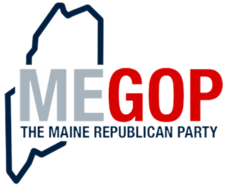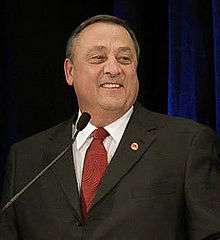Maine Republican Party
Maine Republican Party | |
|---|---|
 | |
| Chairman | Dr. Demi Kouzounas |
| Governor | Paul LePage |
| Senate leadership |
Michael Thibodeau (President of the Senate) |
| House leadership |
Kenneth Fredette (Minority Leader) |
| Founded | August 7, 1854 |
| Headquarters |
9 Higgins Street Augusta, Maine 04330 |
| Ideology |
Conservatism Fiscal conservatism Social conservatism |
| National affiliation | Republican Party |
| Colors | Red (unofficial) |
| Seats in the US Senate |
1 / 2 |
| Seats in the US House |
1 / 2 |
| Seats in the Maine Senate |
18 / 35 |
| Seats in the Maine House |
72 / 151 |
| Website | |
| http://www.mainegop.com/ | |
The Maine Republican Party is an affiliate of the United States Republican Party (GOP) in Maine. It was founded in Strong, Maine on August 7, 1854.
The Maine GOP is noted for its historically strong state College Republican federation. Other affiliate groups include the Maine Federation of Republican Women and the Maine Federation of Young Republicans.
Party history
The Republican Party formed in Maine in 1854 due to Prohibition and the abolitionist movement. Hannibal Hamlin left the Democratic Party because of the slavery issue and helped form the Republican Party. He was the state's first Republican governor. In 1860, he became the first Republican Vice President after Abraham Lincoln won the presidency.
From the 1860s until 1900, James G. Blaine rose as a dominant Republican figure. He was the Speaker of the U.S. House of Representatives, a U.S. Senator, and Secretary of State for three Republican administrations. He ran for President in 1884 but lost to Grover Cleveland. In the late 1800s, Thomas B. Reed served in the House of Representatives for three terms. He started many reforms and was sometimes referred to as "Czar Reed". "Reed's Rules of Order" are still used in Maine Legislatures.
Except for rare lapses, the Republicans dominated Maine politics until 1954, when young progressives from the Democratic Party gained strength.[1]
Margaret Chase Smith was the first American woman elected to serve in both houses of Congress (elected to the House of Representatives in 1940 and the Senate in 1948). In 1964, she was placed in the nomination for presidency at the Republican National Convention.[1]
On August 19, 2013, the resignation of seven members of the State Committee, viewed as libertarian and conservative, was announced along with their unenrollment from the Party. Those who resigned cited numerous grievances with the Party at both the state and national levels, including Party rule changes, support from Congressional Republicans of National Security Agency surveillance programs, and the failure of Legislative Republicans to block tax increases in the recently passed State budget.[2]
Current officeholders
The Maine Republican Party controls the governor's office. It holds a majority in the Maine Senate, and a minority in the Maine House of Representatives. It also holds one of the state's U.S. Senate seats and one of the state's U.S. House seats.
Members of Congress
Statewide offices

State Legislature
- President of the Maine Senate: Michael Thibodeau
- Senate Majority Leader: Garrett Mason
- Assistant Senate Minority Leader: Andre Cushing III
- House Minority Leader: Kenneth Fredette
- Assistant House Minority Leader: Ellie Espling
State committee
Leadership:[3]
- Chairman- Hon. Rick Bennett, Norway [4]
- Vice Chairman- Hon. Susan Morissette, Winslow [4]
- Charles Mahaleris, Secretary, Augusta
- Benjamin Lombard, Treasurer, Augusta
- Hon. Alex Willette, National Committeeman, Mapleton
- Ashley Ryan, National Committeewoman, South Portland
- Stavros Mendros, Androscoggin County Chair, Lewiston
- Michael Marcottee, Androscoggin County Committeeman, Lewiston
- Hon. Lois Snowe-Mello, Androscoggin County Committeewoman, Poland
- Jason Greene, Androscoggin County At-Large, Durham
- Geri Martin, Aroostook County Chair, Fort Fairfield
- Brian Violette, Aroostook County Committeeman, Caribou
- Melissa Willette, Aroostook County Committeewoman, Mapleton
- Eric Lusk, Cumberland County Chair, Harpswell
- George Colby, Cumberland County Committeeman, New Gloucester
- Barbara Harvey, Cumberland County Committeewoman, Portland
- Tim Bryan, Cumberland County At-Large, Falmouth
- Sheila Corey, Cumberland County At-Large, Windham
- Darla Hamlin, Cumberland County At-Large, North Yarmouth
- Annalee Rosenblatt, Cumberland County At-Large, Scarborough
- Ryan Morgan, Franklin County Chair, West Farmington
- Andy Buckland, Franklin County Committeeman, Farmington
- Regina Longyear, Franklin County Committeewoman, Farmington
- Sandra Blanchette, Hancock County Chair, Orland
- Dan Sullivan, Hancock County Committeeman, Surry
- Joyce Fernald, Hancock County Committeewoman, Franklin
- Larry Marshall, Hancock County At-Large, Surry
- Curtis Ayotte, Kennebec County Chair, Farmingdale
- Andrew Mahaleris, Kennebec County Committeeman, Augusta
- Emily Roderick, Kennebec County Committeewoman, Winthrop
- Tyler Leclair, Kennebec County At-Large, Benton
- Bob Carter, Knox County Chair, Warren
- Fred Bucklin, Knox County Committeeman, Appleton
- Martha Johnston-Nash, Knox County Committeewoman, Union
- Stuart Smith, Lincoln County Chair, Edgecomb
- Hon. John McKane, Lincoln County Committeeman, Newcastle
- Jeanette Wheeler, Lincoln County Committeewoman, Waldoboro
- Tim Turner, Oxford County Chair, Buckfield
- Peter Laverdiere, Oxford County Committeeman, Oxford
- Wendy Turner, Oxford County Committeewoman, Buckfield
- Hon. Jarrod Crocket, Oxford County At-Large, Bethel
- Debra Plowman, Penobscot County Chair, Hampden
- Lee Jackson, Penobscot County Committeeman, Old Town
- Irv Master, Penobscot County At-Large, Glenburn
- Vic Beradelli, Penobscot County At-Large, Newburgh
- Hon. Nichi Farnham, Penobscot County At-Large, Bangor
- Charles Shaffer, Piscataquis County Chair, Sebec
- James White, Piscataquis County Committeeman, Guilford
- Trish White, Piscataquis County Committeewoman, Guilford
- Donald McKenna, Sagadahoc County Chair, Bowdoinham
- Tyler Washburn, Sagadahoc County Committeeman, Bowdoin
- Cindy Nesbitt, Sagadahoc County Committeewoman, Bowdoin
- Cynthia Izon, Somerset County Chair, Norridgewock
- Scot Seekins, Somerset County Committeeman, St. Albans
- Patty Maynard, Somerset County Committeewoman, Skowhegan
- Tim Amadon, Somerset County At-Large, Skowhegan
- Robert Hanish, Waldo County Chair, Stockton Springs
- Peter Rioux, Waldo County Committeeman, Winterport
- Patty Keyes, Waldo County Committeewoman, Swanville
- Hon. Chris Gardner, Washington County Chair, Edmunds
- Shane Curtis, Washington County Committeeman, Pembroke
- Marianne Moore, Washington County Committeewoman, Calais
- Burnell Bailey, York County Chair, South Berwick
- John Carson, York County Committeeman, Kittery Point
- Genie Jennings, York County Committeewoman, South Berwick
- Demi Kozounas, York County At-Large, Saco
- Michael Coleman, York County At-Large, Old Orchard
- Bud Hurst, York County At-Large, Old Orchard Beach
- Lauren LePage, Governor LePage's Representative, Waterville
- Bobby Reynolds, Senator Collins' Representative, Gorham
- Garrett Mason, Maine Senate Republicans Representative, Lisbon Falls
- Deborah Sanderson, Maine House Republicans Representative, Chelsea
- Ellen Greeke, Maine Federation of Republican Women President, Tenants Harbor
- Jim Fossel, Maine Young Republicans Chairman, Gardiner
- Tyler Leclair, Maine College Republicans Chairman& Kennebec County At-Large, Benton
Controversies
2010
The Maine Republican Party caused a stir during its 2010 convention when the historically moderate party passed a constitutionally conservative platform supported by "Tea Party" activists. The new platform calls for the elimination of the United States Department of Education and the Federal Reserve System, the rejection of the United Nations Convention on the Rights of the Child (because it would give foreign entities control over U.S. citizens), a freeze and prohibition on stimulus spending, and the prosecution of perpetrators of the "global warming myth". It also demands a "return to the principles of Austrian Economics", and the assertion that healthcare is "not a right" but "a service" that can be addressed only by using "market based solutions". Indeed, the platform says, "The principles upon which the Republican Party was founded, to which we as Citizens seek return, and to which we demand our elected representatives abide, are summarized as follows:[5][6]
- The Constitutions, both State and Federal, are the framework to which any and all legislation must adhere.
- State sovereignty must be regained and retained on all issues specifically relegated to the States by the constitution.
- National sovereignty shall be preserved and retained as dominant over any attempted unconstitutional usurpations of such by international treaty.
- It is the responsibility and duty, of "We the People", to educate both ourselves and others; to demand honest elections free of corruption, and to hold our elected officials to the highest standards of honesty, integrity and loyalty to the constitution."
2012
During the 2012 Maine caucuses, the Maine Republican Party received heavy criticism for mistakes and omissions in voter tallies.[7] The Waldo County GOP Committee called for a censure of Chairman Charlie Webster for his handling of the controversy.[8]
References
- 1 2 James Brunelle. "A Brief History of Maine: Extract from Maine Almanac (1980)". mainehistory.info. Retrieved 14 December 2011.
- ↑ Kevin Miller. "Seven members of Republican State Committee leave party". Kennebec Journal. Retrieved 19 August 2013.
- ↑ State Committee, Maine Republican Party, http://www.mainegop.com/state-committee/, retrieved 14 December 2011
- 1 2 "Rick Bennett elected as new Maine GOP chairman — Politics — Bangor Daily News — BDN Maine". Bangordailynews.com. 2013-07-20. Retrieved 2015-05-04.
- ↑ "Proposed amendment to the platform as put forward by the committee." (PDF). Mainepolitics.net. Retrieved 2015-05-04.
- ↑ "National GOP takes over Maine's Republican Party - About Town". Blog.thephoenix.com. Retrieved 2015-05-04.
- ↑ Hook, Janet (17 February 2012). "Maine GOP Caucuses: Drama Continues". The Wall Street Journal.
- ↑ "Waldo County Republicans call for censure of state GOP chairman after caucus controversy — Politics — Bangor Daily News — BDN Maine". Bangordailynews.com. 2012-02-15. Retrieved 2015-05-04.
External links
- Maine Republican Party
- Rules and By Laws of the Party
- Maine College Republicans
- Maine Federation of Republican Women
- Maine Federation of Young Republicans
- Penobscot County Maine Republican Party
